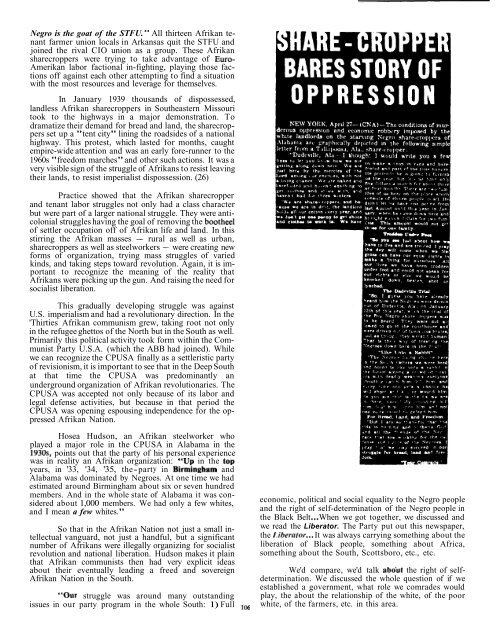sakaisettlersocr
sakaisettlersocr
sakaisettlersocr
You also want an ePaper? Increase the reach of your titles
YUMPU automatically turns print PDFs into web optimized ePapers that Google loves.
Negro is the goat of the STFU. " All thirteen Afrikan tenant<br />
farmer union locals in Arkansas quit the STFU and<br />
joined the rival CIO union as a group. These Afrikan<br />
sharecroppers were trying to take advantage of Euro-<br />
Amerikan labor factional in-fighting, playing those factions<br />
off against each other attempting to find a situation<br />
with the most resources and leverage for themselves.<br />
In January 1939 thousands of dispossessed,<br />
landless Afrikan sharecroppers in Southeastern Missouri<br />
took to the highways in a major demonstration. To<br />
dramatize their demand for bread and land, the sharecroppers<br />
set up a "tent city" lining the roadsides of a national<br />
highway. This protest, which lasted for months, caught<br />
empire-wide attention and was an early fore-runner to the<br />
1960s "freedom marches" and other such actions. It was a<br />
very visible sign of the struggle of Afrikans to resist leaving<br />
their lands, to resist imperialist dispossession. (26)<br />
Practice showed that the Afrikan sharecropper<br />
and tenant labor struggles not only had a class character<br />
but were part of a larger national struggle. They were anticolonial<br />
struggles having the goal of removing the bootheel<br />
of settler occupation off of Afrikan life and land. In this<br />
stirring the Afrikan masses - rural as well as urban,<br />
sharecroppers as well as steelworkers - were creating new<br />
forms of organization, trying mass struggles of varied<br />
kinds, and taking steps toward revolution. Again, it is important<br />
to recognize the meaning of the reality that<br />
Afrikans were picking up the gun. And raising the need for<br />
socialist liberation.<br />
This gradually developing struggle was against<br />
U.S. imperialism and had a revolutionary direction. In the<br />
'Thirties Afrikan communism grew, taking root not only<br />
in the refugee ghettos of the North but in the South as well.<br />
Primarily this political activity took form within the Communist<br />
Party U.S.A. (which the ABB had joined). While<br />
we can recognize the CPUSA finally as a settleristic party<br />
of revisionism, it is important to see that in the Deep South<br />
at that time the CPUSA was predominantly an<br />
underground organization of Afrikan revolutionaries. The<br />
CPUSA was accepted not only because of its labor and<br />
legal defense activities, but because in that period the<br />
CPUSA was opening espousing independence for the oppressed<br />
Afrikan Nation.<br />
Hosea Hudson, an Afrikan steelworker who<br />
played a major role in the CPUSA in Alabama in the<br />
1930s, points out that the party of his personal experience<br />
was in reality an Afrikan organization: "Up in the to^<br />
years, in '33, '34, '35, the-party in ~ir~ingham and<br />
Alabama was dominated by Negroes. At one time we had<br />
estimated around Birmingham about six or seven hundred<br />
members. And in the whole state of Alabama it was considered<br />
about 1,000 members. We had only a few whites,<br />
and I mean a few whites."<br />
So that in the Afrikan Nation not just a small intellectual<br />
vanguard, not just a handful, but a significant<br />
number of Afrikans were illegally organizing for socialist<br />
revolution and national liberation. Hudson makes it plain<br />
that Afrikan communists then had very explicit ideas<br />
about their eventually leading a freed and sovereign<br />
Afrikan Nation in the South.<br />
"Our struggle was around many outstanding<br />
issues in our party program in the whole South: 1) Full<br />
economic, political and social equality to the Negro people<br />
and the right of self-determination of the Negro people in<br />
the Black Belt ... When we got together, we discussed and<br />
we read the Liberator. The Party put out this newspaper,<br />
the I.ihrrator ... It was always carrying something about the<br />
liberation of Black people, something about Africa,<br />
something about the South, Scottsboro, etc., etc.<br />
We'd compare, we'd talk abo'ut the right of selfdetermination.<br />
We discussed the whole question of if we<br />
established a government, what role we comrades would<br />
play, the about the relationship of the white, of the poor<br />
106 white, of the farmers, etc. in this area.


